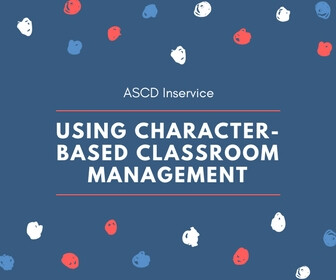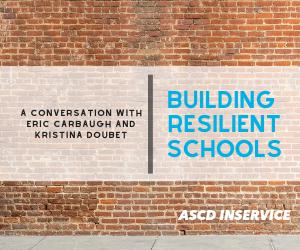You thought you were well qualified for your job, but now you see what you’re missing: a Ph.D. in empathy. Today’s schools are powder kegs, bringing together a mix of adults and children who carry powerful emotions into the classroom: anger, hope, fear, joy, resentment, anxiety, love, despair, and so many more. When those feelings explode, it’s your job, as the leader, to be the steady center, connecting with people despite their human fallibility.
You keep control of your own emotions even when others are reckless with theirs. You listen calmly and act rationally, taking measured steps. You empathize rather than condemn, coaching others through emotional upheavals. Or at least, you try your best to do these things, because that’s the kind of leader you want to be.
Idealistic though it is, we’re right to hold ourselves to this high standard of emotional intelligence. As Brene Brown says in Dare to Lead (Random House, 2018), “Leaders must either invest a reasonable amount of time attending to fears and feelings or squander an unreasonable amount of time trying to manage ineffective and unproductive behavior.” In other words, we ourselves must be steady, grounded, and self-regulated if we are going to help others process their feelings. No pressure, right?
The Price of Repression
Consider how education would look if its leaders were not emotionally regulated. Imagine a principal who screamed right back at the parent complaining about her child’s grades or the department chair who responded to teachers’ complaints by threatening to fire them for noncompliance. Maybe you don’t have to imagine. Maybe you’ve witnessed a leader losing their cool, and if so, the memory likely serves as a cautionary tale. If, like me, you’ve been the leader who lost it in front of a crowd, you’re probably still beating yourself up for it, years later.
When we force ourselves to smile through distress, we are not only repressing but outright denying our feelings.
Leaders need to be bigger than their emotions. But what’s the difference between regulation and repression? At what point does our determination to manage our emotions turn into a denial of our normal human feelings? Can our efforts to keep it cool actually harm us?
Repression comes with side effects, from increased stress to hypertension. Stifling our natural frustration can make us superficially cheerful but actually miserable—the very definition of toxic positivity. When we force ourselves to smile through distress, act like everything is wonderful when it’s not, or project happiness despite pain, we are not only repressing but outright denying our feelings.
So, how can you tell whether you’re doing your job as a leader by regulating your emotions or doing damage to your psyche by repressing them?
Questions to Assess Your Work Persona
You can start by comparing the person you are at work to the person you are at home. Ask yourself, Does the persona I adopt at work align with who I really am?
For me, it does—in fact, I think my job has actually improved my personal life. Before my administrative career, I was terrified of confrontation; now, I can pretty much talk to anyone about anything, both at work and at home, and I know my relationships are better because of it. Likewise, I used to be quick to judge people. My leadership experience has taught me circumspection, and I am a much more compassionate friend and family member as a result. In general, my professional journey has made me a better person outside of work (even if my husband does laugh at my administrative habit of making spreadsheets for every aspect of our lives).
If you can relate, you’re probably building the emotional regulation skills you seek. If, on the other hand, you turn into a different person the minute you set foot in the office, perhaps work is forcing you to project a facade. There is no shame in admitting this; forcing yourself to be someone you’re not is not true emotional intelligence. Ask yourself, If the version of me required for my profession feels wrong, should I reevaluate the profession itself?
A friend of mine used this lens to assess the impact her professional life was having on her personal one. She dropped out of her teacher preparation program during her clinicals, and when I asked what made her leave, she recounted what, to many teachers, will sound like a laughably common story: A student had blown up at the teacher, calling him every expletive under the sun, and she was shocked by the incident.
Hearing this, I scoffed and made some jaded comment to the effect of, “Eh, you grow a pretty thick skin after a while.” My friend looked at me with alarm. She never wanted to grow that thick skin, she explained. It just wasn’t who she was. The idea of turning into a different person at work—or worse, allowing work to actually change her into someone she disliked—led her to choose a different career path.
Some will make a value judgment about this story, saying this person “wasn’t cut out” to be a teacher. This, however, suggests she wasn’t “good enough” for a profession that, ultimately, she decided wasn’t good enough for her.
Ask yourself, Is work changing me into a better person, or is it ruining what I like about myself? When it comes to managing feelings, am I building emotional intelligence at work because I truly desire it, or am I simply saying the right words so that I don’t get fired?
If you’re going through the motions—complying with the rules of “correct” leadership simply because you’re already in this job and you need your paycheck—you’re not alone, and you’re not a monster. In fact, if you can be the steady center, showing empathy to volatile people and controlling your words in the face of provocation, you’re likely doing something right.
Toxic emotions will ultimately weigh you down, canceling out whatever emotional intelligence had been propping you up.
Still, you’ll want to examine your own internal monologue. Ask yourself, On a typical work day, do I feel friction between what I think and what I say? Sure, we’ve all held back a few choice words on occasion, not wishing to be dragged into HR, but if you feel like you’re lying all the time, you’re probably entering the realm of cognitive dissonance—a conflict between what we believe and what we do. This can lead to resentment and repression. If you get to the point of constant cognitive dissonance, studies suggest you’ll experience higher levels of anxiety, stress, shame, and feelings of low self-worth. Those toxic emotions will ultimately weigh you down, canceling out whatever emotional intelligence had been propping you up.
These questions are useful if, like so many educators, you’re questioning whether you’re in the right career. Step back and ask, in short, whether you like the person you are at work; this will help you determine whether to stick it out in education or to find a path that suits you better.
Your Profession Should Serve You
Yes, leaders must hold themselves to high standards, exhibiting what may seem like superhuman levels of emotional intelligence. Yes, the development of these regulatory skills may help leaders in both their personal and professional lives. However, no job is worth constant emotional repression, denial, and cognitive dissonance.
Invest some time in truly analyzing the effects—however rewarding, damaging, or complicated they may be—that your leadership role has on your overall personality. At the end of the day, the ultimate test of emotional intelligence is the ability to discern whether your profession is good enough for you.





